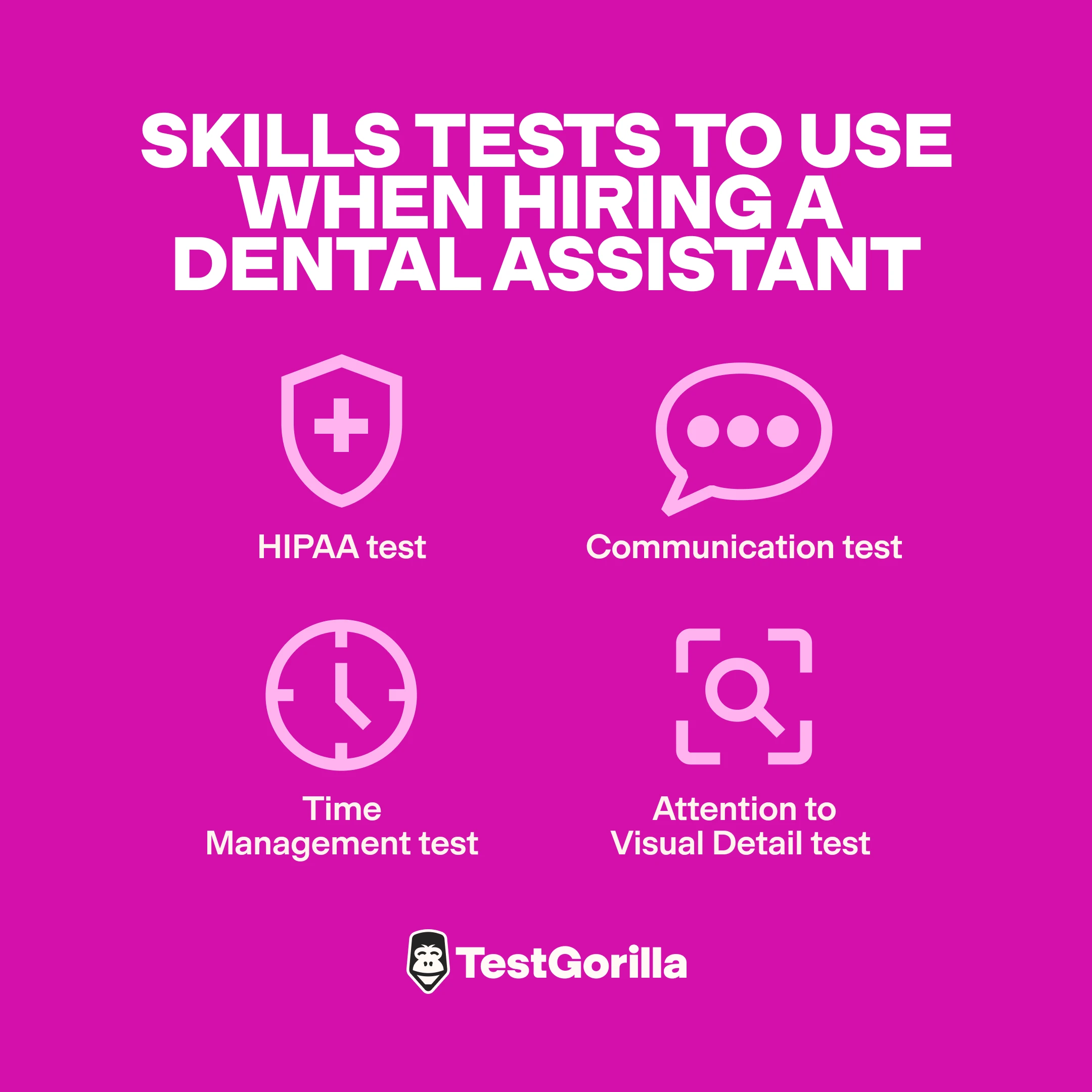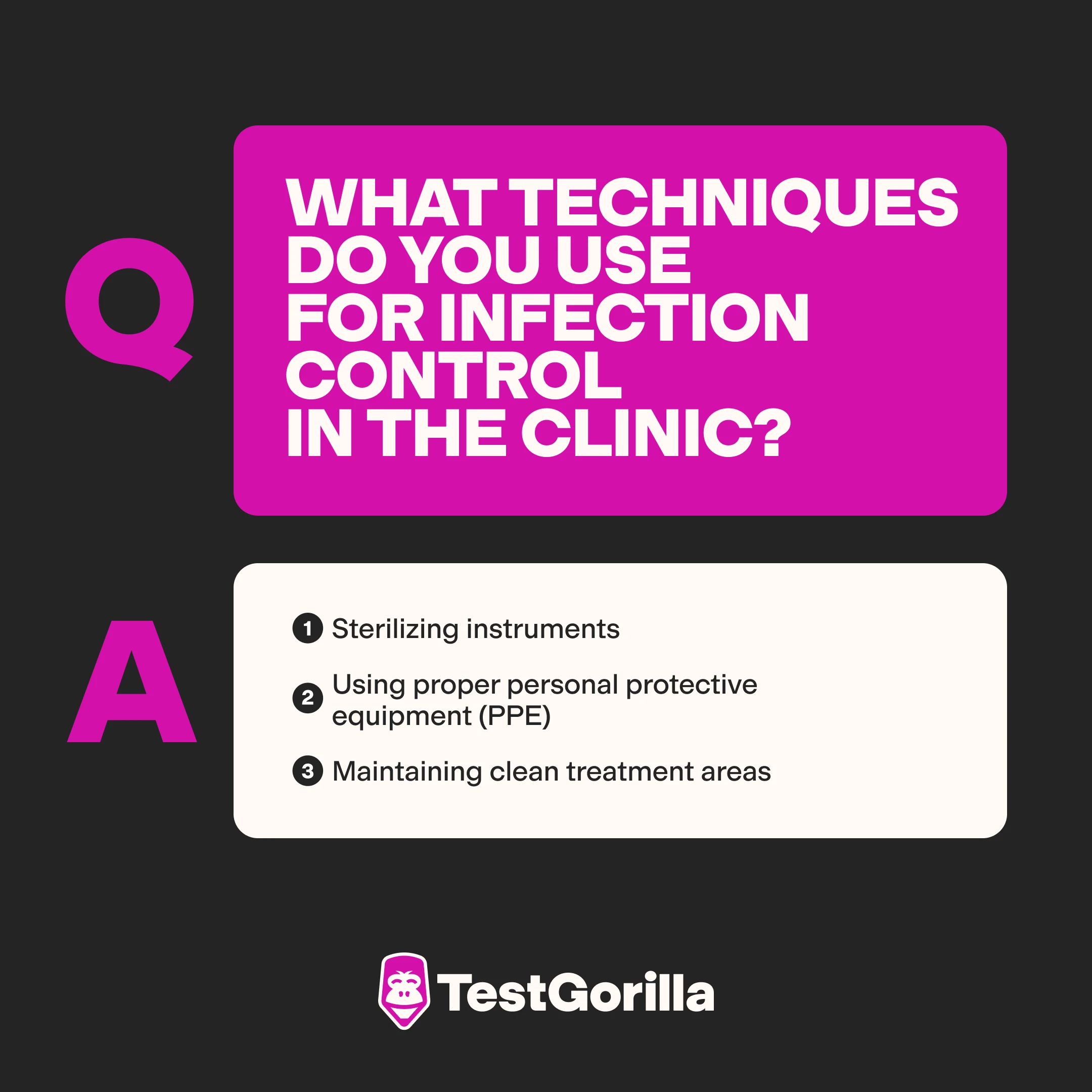60 dental assistant interview questions to hire talented staff for your dental clinic
Dental assistants play a crucial, yet often overlooked role in dental healthcare. They support dentists in providing top patient care and help ensure a smooth and efficient workflow at the clinic.
When looking to hire a skilled dental assistant, it's not just about finding someone with the right qualifications. You need to find the best candidate with the right blend of skills, dedication, and empathy required for the role.
How do you do this, though?
The best way to identify the top candidates in your talent pool is to use a talent assessment featuring skills tests and the right dental assistant interview questions. This way, you’ll be able to assess applicants’ skills objectively and without bias – and make the right hiring decision for your team.
In this article, you’ll find the best interview questions you can ask dental assistants – plus sample answers to 20 of them to help you evaluate their answers.
Table of contents
- What skills tests should you use when hiring a dental assistant?
- Top 20 dental assistant interview questions to evaluate candidates’ technical knowledge and practical skills
- Extra 40 dental assistant interview questions you can ask candidates
- Find top dental assistants with the right interview questions
What skills tests should you use when hiring a dental assistant?
Use our HIPAA test to evaluate applicants’ knowledge of the Health Insurance Portability and Accountability Act (HIPAA) or our Communication test test to make sure you’re hiring top communicators and strong team players.
Add a Time Management test to assess applicants’ organizational skills and an Attention to Visual Detail test to make sure they don’t miss any details – and you’ll have a winning combination.
Top 20 dental assistant interview questions to evaluate candidates’ technical knowledge and practical skills
In this section, you’ll find our selection of the best 20 interview questions you can ask dental assistants when looking to make a new hire for your team.
We’ve also provided sample answers to guide you through the interview evaluation process.
1. Can you tell us about your training and certifications as a dental assistant?
Candidates should explain their background in detail and give you information about any specific dental-assistant programs they’ve completed.
They should mention any certifications they hold, such as Certified Dental Assistant (CDA) or Registered Dental Assistant (RDA), depending on your location.
Beyond any certifications they mention, the best candidates will be the ones who actively seek to upgrade their knowledge and skills.
2. Describe a typical day at your last job as a dental assistant.
Candidates should describe a day filled with varied tasks, showing their ability to handle different situations and requests. They’ll likely mention responsibilities such as:
Preparing treatment rooms
Assisting with standard dental procedures and with dental surgeries
Talking to patients, providing them with additional details and coordinating their care
Record keeping
Cleaning and sterilization of dental instruments and equipment
Skilled applicants will understand the varying needs of dental clinics and also be aware of their role in maintaining efficiency and providing a good experience to patients.
3. Can you explain how you manage the sterilization and disinfection of dental tools and equipment?
Experienced dental assistants will be able to explain the specific protocols for sterilization they follow, such as autoclaving, the use of chemical disinfectants, and the maintenance of sterile storage areas to prevent cross-contamination and infections.
Candidates might also mention adherence to OSHA and CDC guidelines.
4. What experience do you have with dental software and patient scheduling?
Candidates should mention dental-practice software they’ve used in the past to schedule appointments, update patient records, and manage billing. Examples include Dentrix, EagleSoft, or Open Dental.
Don’t limit yourself only to those applicants who are proficient in the software you’re currently using at your practice. Instead, look for candidates who are open to learning new tools and processes.
5. Have you assisted with dental surgeries? If so, what types?
Top candidates will be able to explain their hands-on experience with assisting dentists during different surgical procedures, such as extractions, implants, and periodontal surgeries.
Can they give you details about how they prepare surgical sites and manage tools? Do they show a strong understanding of pre- and post-operative care? Do they know how to put patients at ease, even those who are anxious about surgical procedures?
6. How do you prepare a patient before a procedure?
Preparing patients is a major part of successful patient care. It includes:
Explaining procedures to patients
Answering questions
Helping patients relax, especially if they’re feeling anxious and nervous
Setting up all necessary tools and equipment
Prepping the patient by placing a bib and adjusting the chair
Ensure that the working area is clean and tidy
7. How do you handle dental emergencies?
Candidates should know common dental emergencies, such as severe toothaches, broken crowns, or chipped teeth, and describe the immediate actions they’d take for each.
In all cases, they should stay calm, reassure the patient, ensure their safety, assess the situation, and work together with the dentist to address the issue.
The underlying skill you’re looking to assess with this question, beyond job-specific experience, is communication competence. To gain deeper insights into candidates’ ability to communicate professionally in any setting, use our Communication test.
8. How do you ensure the comfort of patients with dental anxiety?
Look for applicants who can explain their specific strategies for helping patients overcome their anxiety.
Empathy is essential for that, but do they also have a few calming techniques in mind that they can use when needed? Are they able to explain clearly to patients the scheduled procedures, empathize with them, and address their concerns? Do they know how to create a welcoming environment in a dental clinic? Do they know what anesthetic options are available to manage pain and discomfort?
9. Describe your experience with pediatric dentistry.
When working with children, dental assistants should:
Be sensitive to children’s fears and anxieties
Use simple language
Always stay friendly and positive
Make each dental visit fun and educational
Explain what will happen in an age-appropriate way
10. What techniques do you use for infection control in the clinic?
Proficiency with standardized infection control procedures is a must. Candidates should mention:
Sterilizing instruments
Using proper personal protective equipment (PPE)
Maintaining clean treatment areas
Candidates might also mention specific guidelines from national or state health organizations.
11. How would you handle a situation where a patient is not happy with their treatment?
This is another question that helps you evaluate candidates’ communication skills.
In such a situation, they should listen actively to the patient’s concerns, acknowledge their position, and work with the dentist to decide how to correct the situation or explain the treatment outcomes more clearly. High emotional intelligence and excellent problem-solving skills are key.
Use a Problem Solving test to gain deeper insight into applicants’ ability to find solutions to difficult situations.
12. What's your approach to handling sensitive patient information?
Candidates should be well aware of the importance of confidentiality and their adherence to privacy laws such as the Health Insurance Portability and Accountability Act (HIPAA). Look for mentions of specific practices such as:
Securing physical and electronic records
Sharing information only on a need-to-know basis
Using secure methods for transmitting sensitive data
You can also assess dental assistants’ knowledge of HIPAA with our HIPAA test.
13. How do you support other team members during a busy day at the clinic?
The best candidates are great team players, meaning that they’re proactive in helping others. For example, they might offer to take calls, set up the dentist’s office for the next appointments, or explain treatment plans to patients.
Look for applicants who can think on their feet and help manage the workflow by triaging tasks, communicating with others, and helping with urgent tasks.
14. A dentist is running late by more than 20 minutes for their next appointment. What would you do?
In this situation, dental assistants need to take a proactive approach. To manage the situation, they should explain the delay to the patient, offer an apology, tell them how much longer they can expect to wait, and provide updates. They might also offer to reschedule the appointment.
In parallel to that, they should also be in touch with the team and the dentist to manage the day’s remaining appointments effectively.
15. What would you do if you noticed a mistake in a dentist's treatment plan?
The best responses will show a professional approach to sensitive situations.
Candidates should explain they’d first make sure they have all the necessary information, consult the patient’s records, and then talk to the dentist in private to share their concerns. Ensuring the patient’s safety, maintaining their trust, and protecting the dentist’s reputation are key.
16. You notice that a coworker is not following proper sanitation protocols. What do you do?
A tactful and direct approach is best when addressing similar issues. Candidates might choose to remind their coworker of the correct protocols privately, before they escalate the problem to a supervisor. Maintaining good relationships with colleagues is key, but it shouldn’t come second after patient safety.
17. How would you manage a situation where multiple patients are scheduled at the same time by mistake?
Candidates should know how to handle scheduling conflicts efficiently. For this, they’d need to:
Assess the urgency of each appointment
Propose to reschedule less urgent appointments to a different time
Offer an apology and a few different scheduling options
Assess applicants’ organizational skills with the help of our Time Management test.
18. What would you do if a patient has an allergic reaction during a procedure?
Top candidates will know emergency protocols by heart. They should describe their immediate actions such as stopping the procedure, assessing the patient’s condition, and alerting the dentist and other medical personnel, if necessary. If the reaction is severe, they could administer first aid like an EpiPen.
The best applicants will explain how they’d analyze the situation afterward to see whether it could’ve been prevented.
19. A patient faints in the waiting room. What do you do?
Top candidates should clearly outline immediate first aid steps, such as to:
Check for responsiveness and breathing
Call for medical help
Administer CPR if necessary and if they are trained to do so
Monitor vital signs
Keep the patient comfortable until they recover or until help arrives
They should mention the importance of staying calm and reassuring other patients.
20. What is the most challenging dental procedure you have assisted with, and why?
Look for stories that mention specific technical challenges that required quick thinking and precise execution, such as complex root canals, extensive restorative work, or emergency procedures.
Top responses will provide details on how candidates managed these situations and what role they played in achieving a successful outcome.
The best insights on HR and recruitment, delivered to your inbox.
Biweekly updates. No spam. Unsubscribe any time.
Extra 40 dental assistant interview questions you can ask candidates
Looking for more ideas? In this section, you’ll find 40 more questions for dental assistants, ranging from easy to difficult.
What dental procedures are you most experienced with?
What are the most important qualities a dental assistant must have?
Describe how you assist a dentist during a complex dental procedure.
What professional development opportunities are you looking for in your next position?
What steps do you take to ensure patient records are accurate and up-to-date?
What is your approach to taking dental X-rays?
Can you tell us about your experience with taking impressions?
Describe a time when you had to educate a patient about post-treatment care.
What would you do if you realized you forgot to sterilize an instrument needed for a procedure?
Describe your understanding of HIPAA and its importance in a dental office.
How do you handle patients who are afraid of dental procedures?
Can you give an example of how you have handled a difficult or disruptive patient?
What strategies do you use to build trust with new patients?
How do you ensure patient confidentiality?
Can you share an experience where effective communication helped prevent an error?
How do you handle conflicts with a coworker?
Describe how you would handle working with a new dentist.
What steps would you take if you encountered a situation you have never faced before?
How would you explain a dental treatment plan to a patient who has a hard time understanding it due to language barriers?
A patient complains of pain during a routine procedure. What steps do you take?
Have you ever had to report a compliance violation? If so, what was the situation?
What are your views on patient consent in dentistry?
What are your experiences with cosmetic dentistry procedures?
How do you prepare materials for fillings, crowns, and bridges?
Describe your role in orthodontic treatments.
How do you assist in the management of oral diseases?
How do you maintain dental equipment to prevent malfunctions or failures?
What are the critical factors in preparing for and assisting with orthodontic adjustments?
What is your role in the management of patients undergoing cosmetic dental procedures like veneers?
Describe the steps you take to ensure a sterile field during dental procedures.
How do you ensure proper occlusal adjustments during the placement of crowns or bridges?
Explain how you would handle a situation where a patient experiences complications after a procedure, such as excessive bleeding or pain.
What is your approach to managing and organizing dental inventory, especially for materials that are sensitive or have a short shelf life?
Tell us about your experience with restorative dentistry.
How do you prepare and handle materials for composite versus amalgam fillings?
What is your experience with digital radiography? How do you ensure high-quality images?
Can you discuss the protocol for preparing a patient for an implant surgery?
How do you assist in the management and treatment of periodontal disease?
What’s the difference between various types of dental anesthesia? What’s your role in administering them?
Explain your role during a tooth extraction procedure and how you manage patient aftercare.
Find top dental assistants with the right interview questions
Finding a skilled dental assistant for your dental clinic is key. If you make the wrong hire, this could impact patient care and safety, cost you lots of money, and endanger your reputation.
To avoid this, build a skills-first hiring process where you evaluate applicants’ skills with the help of skills tests and then invite the best ones to an interview to ask them technical and practical dental assistant interview questions.
Combine up to five skills tests from our test library for a smooth and bias-free recruitment process. Sign up for a free plan to test the platform – or book a live demo to chat with one of our team members and see how to build the right hiring funnel for your clinic.
Related posts
You've scrolled this far
Why not try TestGorilla for free, and see what happens when you put skills first.




















